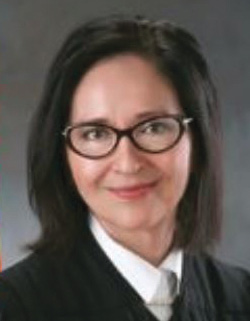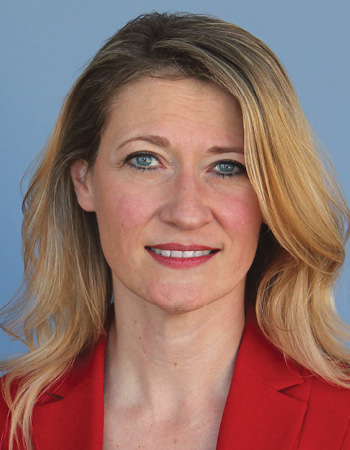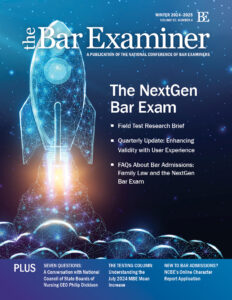Jurisdiction News
Arkansas
Two new members have joined the Arkansas State Board of Law Examiners: Christina S. (“Crissy”) Monterrey and Todd Martin Turner. Monterrey is a partner at Monterrey Law Firm PLLC in North Little Rock, Arkansas. Turner is a partner at Arnold, Batson, Turner & Turner PA in Arkadelphia, Arkansas. Both received their J.D.s from the University of Arkansas at Little Rock William H. Bowen School of Law.
Maryland
Rose Berg, who has been with the office of the Maryland State Board of Law Examiners since 1986 and has served as Clerk to the Board since 2002, retired on April 1, 2018. Nicole Adams, who has worked in the Board’s office since 2008 as Test Accommodations and Re-examination Specialist, has succeeded Berg as Clerk to the Board.
Massachusetts

Hon. David A. Lowy, Liaison Justice to the Massachusetts Board of Bar Examiners
Hon. David A. Lowy, Associate Justice of the Massachusetts Supreme Judicial Court, has been appointed Liaison Justice to the Massachusetts Board of Bar Examiners.
Debra Squires-Lee has stepped down from her position as a bar examiner for the Massachusetts Board of Bar Examiners upon her December 2017 appointment as a judge of the Massachusetts Superior Court.
New Hampshire
Mary Elizabeth Tenn, the former vice-chair of the New Hampshire Board of Bar Examiners, has been appointed chair of the Board. She is a graduate of Harvard Law School and a partner at Tenn and Tenn PA in Manchester, New Hampshire.
Joining the New Hampshire Board of Bar Examiners as its two newest members are Rebeka Fortess, a former law clerk at the New Hampshire Supreme Court who is now a staff attorney for the New Hampshire Circuit Court, and Jon Strasburger, who is in private practice at Bossie, Wilson & Strasburger in Manchester, New Hampshire.
Joining the New Hampshire Committee on Character and Fitness is Elizabeth Mulholland, an attorney with Pastori Krans PLLC in Concord, New Hampshire.
New Mexico

Hon. Barbara J. Vigil, Liaison Justice to the New Mexico Board of Bar Examiners
Hon. Edward L. Chavez, who has served on the New Mexico Supreme Court since 2003 and acted as liaison to the New Mexico Board of Bar Examiners, retired from the Court in March 2018. The new liaison to the Board is Hon. Barbara J. Vigil, who was elected to the Court in 2012 and served as Chief Justice from 2014 to 2016.
Margaret A. (“Peggy”) Graham has joined the New Mexico Board of Bar Examiners. Graham, a graduate of Washburn University School of Law, is of counsel with Pregenzer, Baysinger, Wideman & Sale PC in Albuquerque.
Texas

Allison Drish, Director of Character and Fitness, Texas Board of Law Examiners
Allison Drish has been selected as the new Director of Character and Fitness for the Texas Board of Law Examiners, following the resignation of Lori Adelman in March 2018. Drish was most recently Assistant Director of Character and Fitness for the Board and served as president of the Council of Bar Admission Administrators in 2015–2016. Her successor as Assistant Director of Character and Fitness is Kendelyn Schiller, who has served as Executive Assistant to the Board and is a former licensure analyst for the Board.
NCBE News

April Southwick, MBE Program Director, NCBE
April Southwick is NCBE’s new MBE Program Director. Southwick, who has spent the past nine years as Attorney and Executive Director for the Wisconsin Judicial Council, replaces C. Beth Hill, who was named NCBE’s Director of Test and Information Security in November 2017 and had served as MBE Program Director since November 2012.
Noteworthy
A judge in the United States District Court for the Northern District of California recently held the Law School Admission Council (LSAC) in contempt for failing to comply with certain procedures established in a 2014 Consent Decree and a “best practices” report that was prepared by a panel of professionals under that Decree.
The California Department of Fair Employment and Housing (DFEH) sued LSAC in 2012 alleging violations of California’s Unruh Act and the Americans with Disabilities Act in how LSAC considered requests to accommodate disabilities for those seeking to take the LSAT. The core allegations were that (1) LSAC requested too much supporting documentation, (2) LSAC should have granted accommodations to certain individuals, and (3) LSAC’s practice of annotating scores achieved with extended testing time was unlawful. The United States was allowed to intervene as an additional plaintiff shortly after the lawsuit was filed.
In 2014, the United States, DFEH, and LSAC settled the lawsuit and entered into a Consent Decree. The Decree imposed a number of requirements on LSAC: LSAC made significant monetary payments to named plaintiffs and to a class settlement fund, LSAC agreed to stop annotating test scores, LSAC agreed to automatically grant extended testing time to individuals based on receipt of equivalent accommodations on prior standardized admissions tests, and the parties agreed to establish best practices with regard to handling accommodation requests and record keeping. The Decree also appointed a monitor to audit LSAC’s compliance with the Decree and a panel to recommend best practices.
DFEH brought a contempt motion in October 2017, alleging that LSAC was in violation of some provisions of the Decree and seeking to extend the Decree for another two years. The United States did not join in DFEH’s motion. In a decision dated March 5, 2018, the federal magistrate judge found that LSAC had violated some of the procedures established by a panel of experts convened pursuant to the Decree and extended the Decree’s term for two years, as requested by DFEH.
Original case:
Dep’t of Fair Emp’t & Housing v. Law Sch. Admission Council, Inc., No. 12-cv-01830-JCS, 2015 WL 4719613 (N.D. Cal. Aug. 7, 2015)
Contempt:
Dep’t of Fair Emp’t & Housing v. Law Sch. Admission Council, Inc., No. 12-cv-01830-JCS, 2018 WL 1156605 (N.D. Cal. Mar. 5, 2018)







